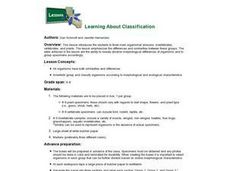Curated OER
What Plants Need
Students plant seeds in milk cartons, over the next two weeks, they watch the plants closely to see how they grow and change. They keep a photo journal to record the growth of the plant.
Curated OER
Soil In The Amazon
Learners grow plants in soil representing that found in the Amazon basin. They compare results to plants growing in fertile soil and soil fertilized with leaf compost. Students chart, average and graph plant growth by height.
Learners...
Curated OER
Forests and Photosynthesis
Fourth graders explore the concept of photosynthesis. They investigate the effects of light on seedlings. Students grow plants and record the data. Students view satellite images that show the monthly amount of vegetation present in the...
Curated OER
Life Cycles
Using computers, Students work in small groups and progress through the roles of Explorer, Researcher, Designer, and Evaluator as they study the life cycle of plants, insects, butterflies and frogs.
Curated OER
Plant Parts and Functions
Fifth graders examine two or three unfamiliar flowers or fruits, such as eggplant and mango and realize that each flower or fruit comes from a flowering seed plant. They then identify the plants.
Curated OER
Create a Field Guide of Local Plants
Students become familiar with making herbarium specimens as well as utilizing field guides to help identify the species which they gather. They use their herbarium collection to create personalized field guides with plants in their...
Curated OER
Growing a Winter Garden
Second graders listen to planting story, identify vegetables in pictures, and watch teacher demonstrate proper way to plant seeds in soil, and water. Students then plant seeds into their own containers.
Curated OER
Are Fruits And Vegetables Really Made of Cells?
Students design and carry out an exercise to determine if a given fruit or vegetable is composed of cells. They dissect out sections of the fruit or vegetable, prepare stained slides, and make observations under a compound microscope.
Curated OER
Plant Identification Pictionary
Students participate in a plant identification game. Using worksheets, they collect plant samples and identify the basic parts of the plant. They note the similarities and differences between the various diagrams. They use heavy books...
Curated OER
What Color is Chlorophyll?
Students observe the interactions of chlorophyll and light. They develop and form their own testable hypotheses. Students predict the color of chlorophyll in various types of plants.
Curated OER
Learning About Classification
Students explore the three main organismal divisions. Students classify organisms by invertebrates, vertebrates, and plants. They observe the differences and similarities between these groups.
Curated OER
Plants And Animals in the Local Environment
Students observe the various living things they can find outside their playground making sure to look both on the ground and in the air. They develop a large poster Venn digram, as a class, of plants and animals that live in the air, on...
Curated OER
From McGee's Farm to the Movies
Learners participate in several plant-themed activities. They keep a food log, identify any plants they have eaten and then classify these foods by the part of the plant that is edible. Students sing songs about plants, make collages,...
Curated OER
Life cycles
Students identify and explain the parts of a flower and their role in the life cycle of flowering plants, including pollination, seed dispersal and germination using the Internet. Students will also study and discuss the key points and...
Curated OER
Urbanization and Native Hawaiian Plants
Fourth graders research plants native to the Hawaiian Islands. Using the plants, they identify its purpose in the watershed and ways to help protect them from extinction. They survey a area of land and discover ways in which to bring...
Curated OER
Light Plants and Dark Plants, Wet Plants and Dry Ones
Students plant sunflower seeds in plastic cups, and once germinated, these are exposed to different conditions of light levels and/or soil moisture contents. Students measure growth of the seedlings every few days using non-standard...
Curated OER
Leaf Straw
Students investigate plant structure and the process of photosynthesis. Using everyday items, they demonstrate that the leaves and stems of plants can act like a straw. In addition, they identify plant structure.
Alabama Learning Exchange
The Amazing Antigravity Stem
Second graders investigate how the stem of the plant carries water and minerals upwards from the roots to other parts of the plant. They observe what happens after a flower is placed in dyed water. They word process their observations...
Curated OER
Quadrat Studies
Students use quadrats to investigate plants, animals, soils and weather. They answer questions as they fill in each quadrat. They share their information with the class.
Curated OER
Hydroponics
Young scholars discuss the concept of hydroponics. They create and run their own hydroponics system. They record and analyze the data they collect.
Curated OER
Plants
Third graders study the factors necessary for plant growth and how plants adapt to their environment. They examine ow different plants require different environments to thrive.
Curated OER
Cells are 3-D!
Students design three dimensional models of plant and animal cells. They identify the cells parts, and compare animal and plant cells.
Curated OER
Plants and Animals of Great Bay Animals and Plants of the Estuary
Students participate in a webquest about the plants and animals that inhabit an estuary. They role play as environmentalists researching this habitat and present the results of their research in a creative way.
Curated OER
Marine & Aquatic Habitats Activities - Habitats of Birds, Fish, and Mammals on the Island and the Pacific Region
Students create habitats in jars to understand integral aspects of plants' and animals' habitats.

























